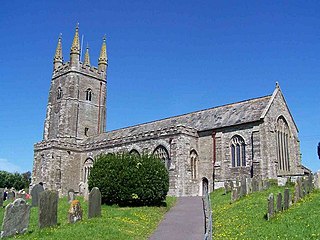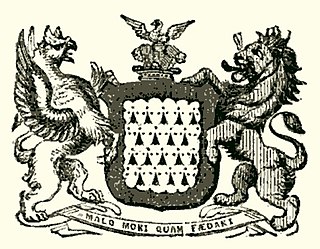Alexander Plunket was an Irish statesman and judge of the fifteenth century.
George Cromer was Archbishop of Armagh and Primate of All Ireland in the reign of Henry VIII of England, from 1521/2.

West Alvington is a small village, located on the outskirts of Kingsbridge in South Devon on the A381 road. The appropriate electoral ward is called Westville and Alvington. Its population at the 2011 census was 2,042. It has a primary school and is about a 10-minute walk from the centre of Kingsbridge.
Sir Gerald Aylmer was an Irish judge in the time of Henry VIII, who played a key part in enforcing the Dissolution of the Monasteries. His numerous descendants included the Barons Aylmer.

John Barnewall, 3rd Baron Trimleston, was an Irish nobleman, judge and politician. He was the eldest son of Christopher Barnewall, 2nd Baron Trimlestown and his wife Elizabeth Plunket, daughter of Sir Thomas Fitz-Christopher Plunket of Rathmore, Lord Chief Justice of the King's Bench in Ireland and his second wife Marian Cruise. He succeeded his father as 3rd Baron about 1513. His father, like most of the Anglo-Irish aristocracy, had supported the claim of the pretender Lambert Simnel to the English throne in 1487. After the failure of Simnel's rebellion, he received a royal pardon.
Nicholas St Lawrence, 4th Baron Howth was a leading Irish soldier and statesman of the early Tudor period, who held the office of Lord Chancellor of Ireland.
Sir Thomas FitzGerald of Laccagh (c.1458–1487) was an Anglo-Irish lawyer, statesman and soldier who was Lord Chancellor of Ireland under Richard III and Henry VII, but rebelled against Henry and was killed at the Battle of Stoke.
Sir John Alan was a leading English-born statesman in sixteenth century Ireland. He was a member of the Irish House of Commons, and held the offices of Master of the Rolls in Ireland, Chancellor of the Exchequer of Ireland and Lord Chancellor of Ireland. Though he was childless himself, one of his brothers, William, founded a prominent landowning dynasty in County Kildare. The family's holdings included lands at Celbridge, St. Wolstan's and Kilteel, County Kildare, as well as substantial lands in County Dublin. They also acquired a baronetcy.
Sir Thomas Luttrell was a wealthy Anglo-Irish landowner of the sixteenth-century Irish Pale. He was also a distinguished lawyer and judge who held the offices of King's Serjeant, Solicitor General for Ireland and Chief Justice of the Irish Common Pleas.
Richard Delahide was an Irish judge of the sixteenth century, who held the offices of Chief Justice of the Irish Common Pleas and Chief Baron of the Irish Exchequer. His career was seriously damaged by the Rebellion of Silken Thomas, in which several members of his family played a leading part, and he was fortunate to escape permanent disgrace.
Patrick Bermingham (c.1460–1532) was an Irish judge and statesman of the Tudor period who held the offices of Lord Chief Justice of Ireland and Chancellor of the Exchequer of Ireland. He was a firm supporter of English rule in Ireland and enjoyed the confidence of Henry VIII, who regarded him as a mainstay of the Irish administration.
Henry Burnell was an Irish judge and politician; he served briefly as Recorder of Dublin and as a justice of the Court of King's Bench. Though he was willing to accept Crown office, he spent much of his career in opposition to the Government. He was one of the leaders of the protest against the policies of the Lord Deputy of Ireland Sir Henry Sidney in the late 1570s, and as a member of the Irish House of Commons in the 1580s he successfully opposed Sidney's successor, Sir John Perrot. In the early 1600s, he was one of the leaders of the protest against strict enforcement of the Penal Laws. His professional reputation was gravely damaged in his later years by a verdict that he was guilty of forgery, when he was convicted and fined for having altered a deed concerning the inheritance of the 11th Earl of Kildare's estate. He was the grandfather of the playwright Henry Burnell.
Sir Simon Fitz-Richard was an Irish landowner, barrister and judge. He became Chief Justice of the Irish Common Pleas, and fought a long and successful campaign against the efforts of his enemies to remove him from office, despite the numerous accusations of corruption which were made against him.
Sir William Darcy (c.1460–1540) was a leading Anglo-Irish statesman of the Pale in the early sixteenth century; for many years he held the office of Vice-Treasurer of Ireland. He wrote an influential treatise, The Decay of Ireland, which led to his being called "the father of the movement for political reformation in Ireland". He was a colourful and flamboyant character, whose exceptional height gave rise to his nickname "Great Darcy".
Sir Thomas Kent was an Irish judge who held office as Chief Baron of the Irish Exchequer.
The Brotherhood of Saint George was a short-lived military guild, which was founded in Dublin in 1474 for the defence of the English-held territory of the Pale. For a short time it was the only standing army maintained by the English Crown in Ireland. It was suppressed by King Henry VII in 1494, due to his suspicions about the Brotherhood's loyalty to his dynasty. It was not an order of knighthood, although some of its individual members were knights.
Sir Thomas Plunket (c.1440–1519) was a wealthy Irish landowner, lawyer and judge in fifteenth-century and early sixteenth-century Ireland. He held office as Chief Baron of the Irish Exchequer and Chief Justice of the Irish Common Pleas. After the change of the English royal dynasty in 1485, his loyalty to the new Tudor dynasty was deeply suspect, and he was involved in two attempts to put a pretender on the English throne. On each occasion he was disgraced, fined and removed from office; yet he had sufficient political influence to ensure his return to favour and high office.
Thomas Cusacke, Cusack or de Cusack was an Irish barrister and judge, who held the offices of Attorney General for Ireland and Lord Chief Justice of Ireland. He should not be confused with his much younger cousin Sir Thomas Cusack, Lord Chancellor of Ireland, who was a child of about six when the elder Thomas died.
Hugh Canoun, or Hugh Canon was an English-born judge in early fourteenth-century Ireland. He was a justice of the Court of Common Pleas (Ireland) and served as Deputy Justiciar of Ireland. As a judge he was praised for his good and faithful service to the English Crown, and as a lawyer he was known as "a man very knowledgeable about all the King's business". On the other hand, his loyalty to the Crown during the Bruce Invasion of Ireland in 1315-18 was said to be extremely doubtful, although he was saved from disgrace by his influential connections. He was murdered by Andrew de Bermingham of Athenry during the last months of the Bruce Invasion, in the course of a private feud.
Walter Ivers, Evers or Yvers was an English-born Crown official and judge in late fifteenth-century Ireland. For a few years in the 1490s, he was a key ally of Sir Edward Poynings, Lord Deputy of Ireland 1494-6.
 West Alvington - All Saints Church
West Alvington - All Saints Church 
